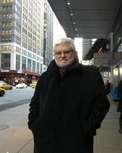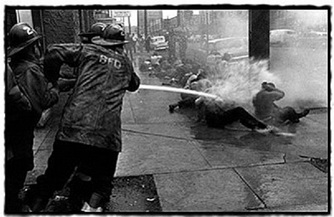 Chris
McDonnell, UK
Chris
McDonnell, UKchris@mcdonnell83.freeserve.co.uk
 Chris
McDonnell, UK
Chris
McDonnell, UK
chris@mcdonnell83.freeserve.co.uk
Previous articles by Chris
Comments
welcome here
August 23, 2017
A significant lapse of memory

In 1963 the fire hoses in the city of Birmingham
Alabama were turned on those protesting for civil rights. The flames
they hoped to put out were unquenchable. Yet the anger expressed by the
city authorities then is still latent today in the America of the current
occupant of the White House.
I make no apology for returning to a
topic that has been addressed one way or another in this column over
recent months. Since the clashes in Charlottesville in Virginia and the
pathetic Presidential response, we are being forced to address those same
issues again, not only by citizens of the US but by many in other parts of
the world. David Brooks, writing recently in the New York Times suggests
that "He [the President] took a nation beset
by uncertainty and he gave it a series of "explanations" that
were simple, crude, affirming and wrong." One fundamental fact was evident from
the newscasts, that in spite of so much progress, including eight years of
Obama, the first black President, there is still a small but very real
opposition to the principles of Civil Rights. That caucus is now being
given a voice from the President in utterances that have been rejected
across the political spectrum. Writing in his biography 'Long walk
to freedom' Nelson Mandela reminds us that "No one is born
hating another person because of the colour of his skin, or his
background, or his religion. People must learn to hate, and if they can
learn to hate, they can be taught to love, for love comes more naturally
to the human heart than its opposite." For alongside the
examination in the US of societal values, South Africa was suffering the
outrages of apartheid with Mandela in jail on Robben Island. A new order
was coming to birth on two continents, old values were being challenged. How are we to deal now with the
simplicity of this new fanaticism? We are living in an age of anxiety,
where the quick fix, the smart tweet, the spiteful come-back have become
the working currency of the public politics. Who would have thought that
after dignity of the Obama years, a great nation would be led in such a
fashion? Yet still his invitation to visit the UK remains on the table.
There is a risk that his visit will by association put us in the same
murky water that is his habitat. To see torches and swastikas on the
streets of Charlottesville Virginia is to be reminded of Europe in the
30s. Each of us has a responsibility to raise our voice offering an
alternative view, where compassion and justice predominate in our decision
making and in our prayer. We should never forget the black
Christian roots of the Civil Rights movement in the South. When Martin
Luther King addressed the huge crowd in Washington DC in March 1963, the
speech wasn't going that well, his audience hot and tired were becoming
inattentive. King turned away from his prepared text, grasped the podium
and spoke with greater urgency. One of those behind him, noticing his
changed stance to that of a Baptist preacher, turned to the person next to
him and said: "Those people don't know it, but they're about
to go to church." His words that day from the steps of the
Washington memorial still echo with the goodness of his intention and
cannot be drowned by present chaotic confusion. Words have the potential to penetrate to
the very heart of an issue. They can challenge the status quo and offer
hope in a confused world. The words that follow were written a couple of
days after Charlottesville. That voice in me that weeps for us* Look about you and quietly weep within for you cannot fail to see the deep distress of others passing by. Their frail voices and tired eyes gaze across the streets of years, their angry indignation seeks recompense as frailty and tiredness give way to pent-up, explosive rage. Injustice confronted with bare hands, distrust born of confused lives and worn-out dreams. Listen, listen for peace walking through narrow passage ways, meeting those with little left apart from principle, pause by brick-broken windows and burnt-out cars. And weep within and turn again. The title-line is from a poem called 'Voice' by
the Polish Nobel Laureate, Czeslaw Milosz, written in 2002. If you need reminding of the journey,
then just Google images of the Civil Rights movement to see the
mid-Century street scenes from the American South, to see how brutality
was met with courage, often captured by the black and white photography of
Charles Moore. Many of his images have been collected in his book "Powerful
Days". It helps us all remember just what is at stake in the
present time, some sixty years on. END